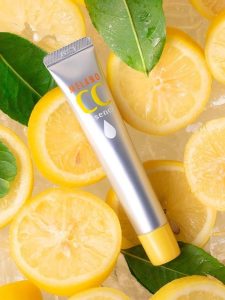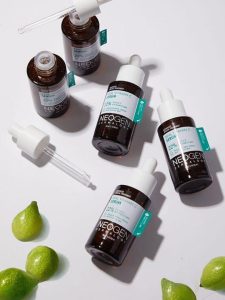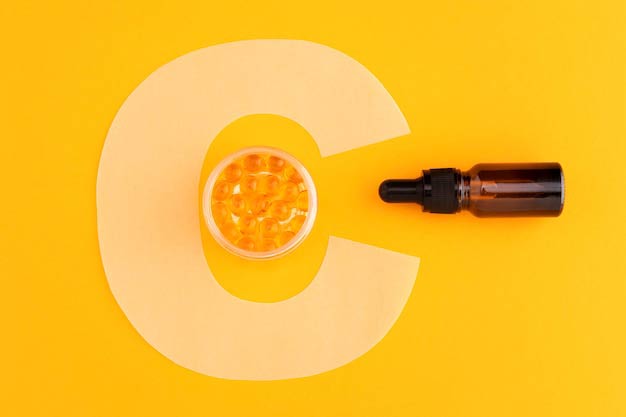You must have heard of beauty recipes with lemon or orange. Although vitamin C was only discovered in 1912, the use of extracts such as lemon, yuja etc. in cosmetic preparations was widespread since ancient times. It is now a legend, the holy grail, the most loved ingredient in skin care and not without reason.

What is :
Anti-aging, anti-inflammatory, nourishing antioxidant ingredient that improves skin tone and texture, brightens, moisturizes, in other words, transforms the skin.
How do we meet her?
In many forms, time for some chemistry:
- L-Ascorbic Acid. This is one of the most common forms of vitamin C in skin care. It is vitamin C in its pure form and is soluble in water. It is powerful and able to stimulate collagen production and fade pigmentation. Its disadvantages are that it is unstable to light and heat and must be stored in dark containers and low temperatures
- Ascorbic acid polypeptide. This is a vitamin C derivative and is water soluble. What's great about it is that it's stable and turns into vitamin C as soon as it comes in contact with the skin. Although it is just a derivative, it performs the role of vitamin C in skin care just as well. However, it could be irritating to people with extremely sensitive skin.
- Palmitic Ascorbyl. Ascorbyl palmitate is L-ascorbic acid combined with palmitic acid. It also improves collagen production and fights free radicals. However, this form is only effective at high concentrations
- Magnesium ascorbyl phosphate. This form is also a derivative of vitamin C and is also water soluble. It can be effective even at a lower concentration.


Where is the benefit?
The benefits of vitamin C are many and impressive.
- Anti-aging: Boosts collagen production. Vitamin C stimulates skin cells to produce more collagen. Collagen is a protein that keeps the skin healthy and firm.
- Healing. It aids in wound healing by controlling the inflammatory response as well as encouraging tissue growth. Vitamin C can heal sunburns and cuts much faster. Antioxidants in vitamin C reduce free radicals which are a slowing factor in cell renewal. It also helps reduce redness
- Glowing and smoothing of the skin tone. It is noteworthy that the role of vitamin C is to brighten and whiten the skin. Vitamin C reduces melanin production and lightens dark spots on your skin. It brightens dull skin and evens out skin tone, erasing blemishes, Vitamin C is widely used to correct hyperpigmentation and dark spots. Vitamin C has an anti-pigmentation effect that can even out your skin, as well as prevent wear and tear and further discoloration.
- Peeling. Vitamin C's role in skin care also extends to skin exfoliation, which helps reveal a lighter skin tone on the surface. The exfoliation caused by vitamin C is different from the natural exfoliation that occurs with a facial scrub.
- Photoprotection. Sun and UV protection is also included in vitamin C's role in skin care. Vitamin C can serve as a shield against photodamage, including sunburn, redness and discoloration. It acts as an effective protection against UVA and UVB rays. However, it does not replace your sunscreen. Ideally use the vitamin C product before your sunscreen.
- Anti-inflammatory action: In addition, it has anti-inflammatory properties that are beneficial in cases of acne and rosacea. Acne can be caused by free radicals, which come from sunlight or air pollution and can increase inflammation in the skin. Dead skin cells, bacteria and dirt will get trapped inside the pore due to this inflammation and lead to the formation of a pimple. Vitamin C, as an antioxidant, neutralizes free radicals and helps prevent acne formation. Its anti-inflammatory action and its healing abilities help significantly in the treatment, while its action also continues to heal acne scars.
- Reduces dark circles under the eyes. Reducing the appearance of dark circles under the eyes is also part of vitamin C's role in skin care.

How to use it?
Morning evening : In the morning we benefit more from the photoprotection and glow it provides, in the evening from its antiaging and nourishing properties. It can be used both morning and night.
Skin types: Oily and combination skins are balanced and hydrated. Vitamin C can help hydrate the skin and balance sebum production, it can even tighten pores. Normal and dry skin retain moisture better in the skin Vitamin C can reduce roughness and improve hydration. It is suitable for all types of parcels
What to watch out for:
Allergies and skin sensitivity. Several citrus extracts with vitamin C (even our familiar lemon) are classified as allergens and some people may be allergic to them. Although this particular ingredient is already in our body, in sensitive skins it may create redness, especially if it is in a high content.
Save : Products containing unstable vitamin C are already in dark containers. We are careful to keep them in dark and cool places.
Bad combinations in the same beauty routine.
Ingredients that should be avoided to be used together, however they can be comfortably used one in the morning and the other in the evening or on different days.
Benzoyl peroxide used as a treatment for mild acne. Reduces acne-causing bacteria, and fights dryness. However, combining benzoyl peroxide with vitamin C may not do you any good. Topical treatment with benzoyl peroxide will actually oxidize vitamin C, neutralizing each other's effects.
The retinoids provide anti-aging action that helps reduce the appearance of fine lines and wrinkles and boosts collagen production. Combining retinol with vitamin C can cause peeling, redness and irritation. Using these two ingredients together can cause more damage than UV radiation. Therefore, it is ideal to use vitamin C in your morning skin care routine and retinol in your nightly skincare routine.
Alpha Hydroxy Acids (AHAs) and Beta Hydroxy Acids (BHAs) they are chemical exfoliants. AHAs help renew the skin's surface, BHAs penetrate deeper into pores to remove dead cells and excess sebum. Alpha hydroxy, beta hydroxy and vitamin C are all acidic components. Although in cases of acne the combination works beneficially AHA/BHA with vitamin C, may cause skin irritation.
THE niacinamide , also known as vitamin B3, is an essential nutrient that helps build protein in the skin, treats uneven skin tone, reduces enlarged pores, prevents fine lines and wrinkles, and adds a healthy glow. However, combining niacinamide with vitamin C will chemically neutralize each other, rendering both formulas ineffective on the skin. Niacinamide takes away all its good properties vitamin C and turns it into a substance that can cause redness and breakouts. However, there are exceptions. There are products that combine them in the same formula, in this case specific forms of the ingredients are used, which are laboratory tested and dermatologically safe for their use and effectiveness.
Pregnancy/breastfeeding/skin conditions:
Vitamin C as an ingredient in skin care products is safe for pregnancy and breastfeeding, however we always check the rest of the ingredients. Although it works beneficially for many skin conditions such as acne or hyperpigmentation, it may not be suitable for any irritations. It is safer to consult our dermatologist.

Tip 1: As with all ingredients in a concentrated form (emulsion/serums/ampoules), moisturizing afterwards is important to "lock in" their action and provide the necessary moisture to the skin. For vitamin C it is even more important as its exfoliating action and its ability to help retain moisture make hydration super essential.
Tip 2. Vitamin C in the morning and sunscreen. Although you don't need extra reasons to wear sunscreen in the morning, it is necessary to use a sunscreen of at least SPF 30 for the maximum performance of photoprotection,
Vitamin C is already present in our body and we get it from our diet. Many fruits and vegetables such as strawberry, pepper and many others are capable of giving us the daily amount we need. It is suitable to improve many skin imperfections but is also necessary to maintain it when it is already healthy and beautiful.
